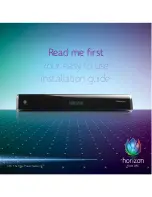
v
•
Do not charge the battery for longer than the specified
time!
If the battery pack has not fnshed chargng even after the
regulated tme has passed, stop t. The battery may generate
heat or smoke, rupture, or burst nto flame.
•
Do not place the battery pack into a microwave or high
pressure container!
The battery may generate heat or smoke, rupture, or burst nto
flame.
•
Keep ruptured and leaking battery packs away from fire!
If the battery pack s leakng (or the battery emts a bad odor),
mmedately remove t from flammable areas. Electrolyte
leakng from battery can easly catch on fre and may cause the
battery to generate smoke or burst nto flame.
•
Do not use an abnormal battery!
If the battery pack emts a bad odor, appears to have dfferent
colorng, s deformed, or seems abnormal for any other reason,
remove t from the charger or operatng equpment and do not
use t. The battery may generate heat or smoke, rupture, or
burst nto flame.
•
Do not reverse-charge or reverse-connect the battery!
The battery pack has postve and negatve poles. If the battery
pack does not smoothly connect wth a charger or operatng
equpment, do not force t; check the polarty of the battery. If
the battery pack s reverse-connected to the charger, t wll be
reverse-charged and an abnormal chemcal reacton may occur.
The battery may generate heat or smoke, rupture, or burst nto
flame.
•
Do not touch a ruptured and leaking battery!
If the electrolyte lqud from the battery gets nto your eyes,
wash your eyes out wth fresh water as soon as possble,
wthout rubbng your eyes. Go to the hosptal mmedately. If
left untreated, t may cause eye-problems.
Summary of Contents for TK-5220
Page 2: ...VHF P25 TRANSCEIVER UHF P25 TRANSCEIVER TK 5220 TK 5320 Instruction Manual ENGLISH ...
Page 43: ......
Page 44: ......












































